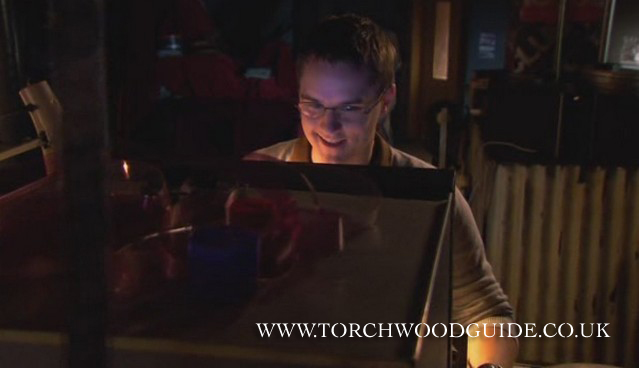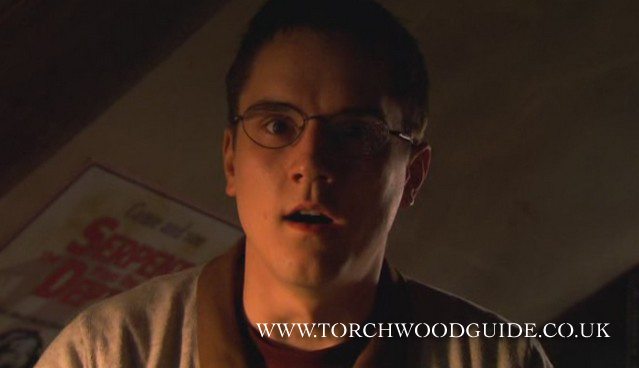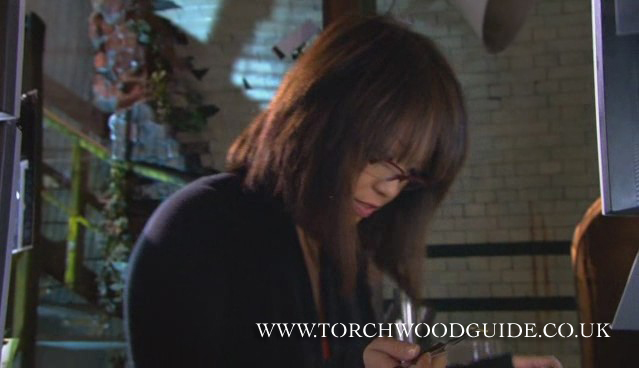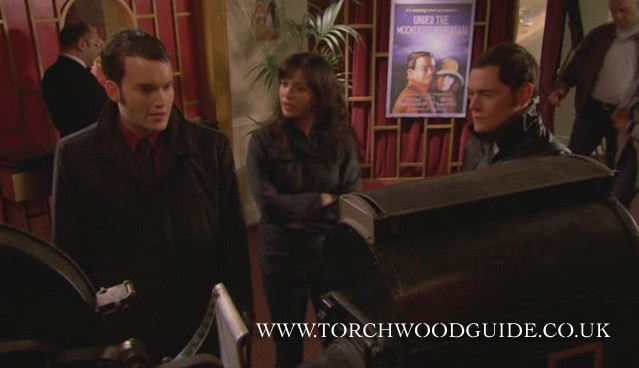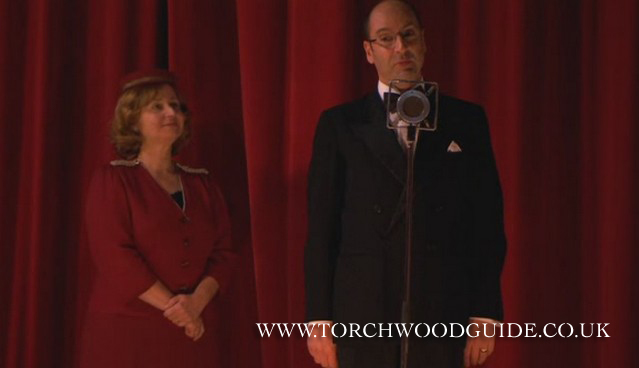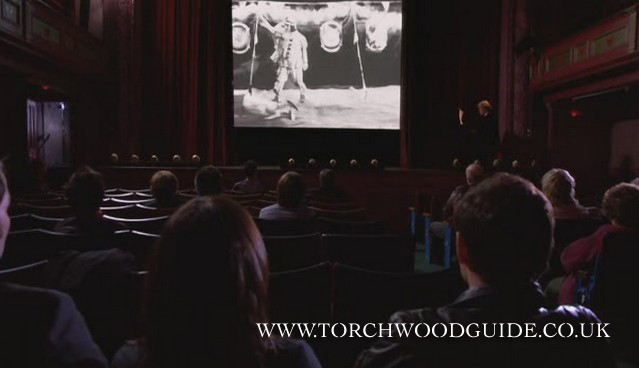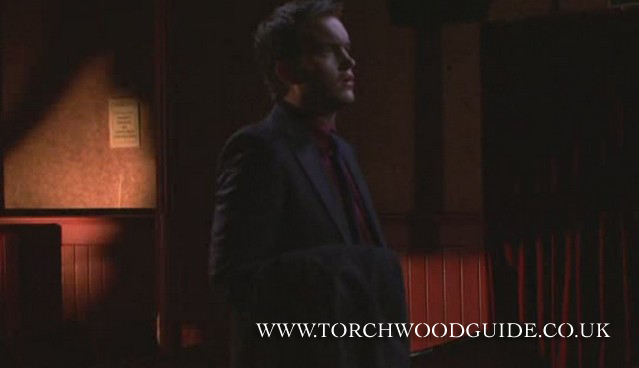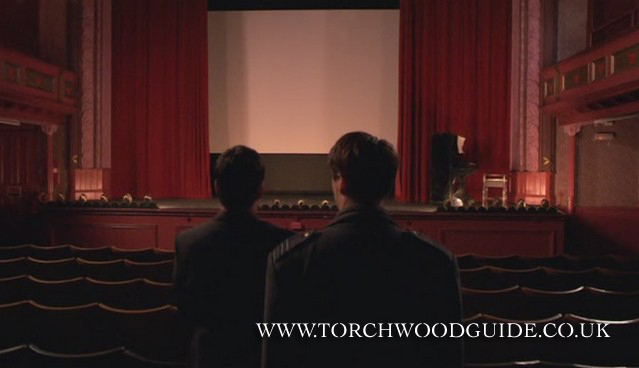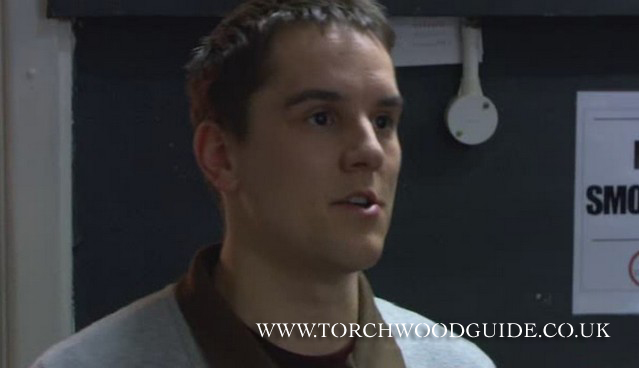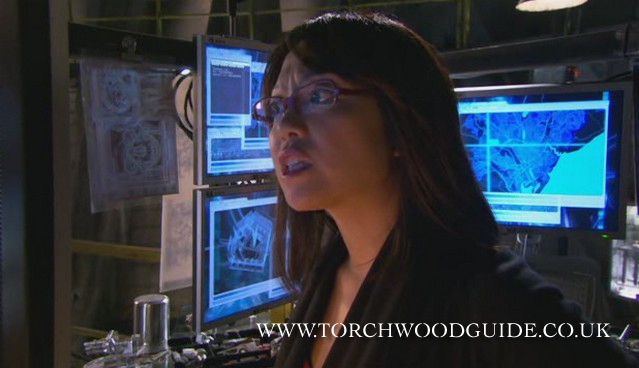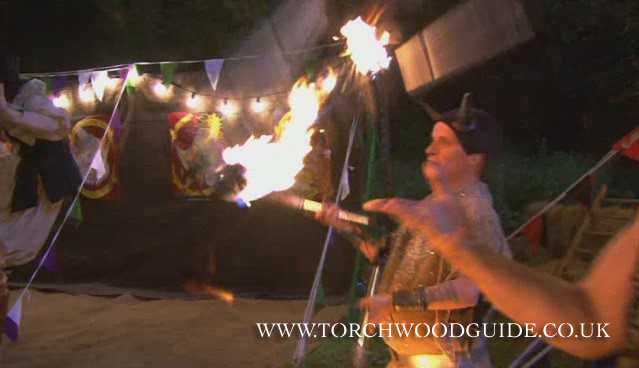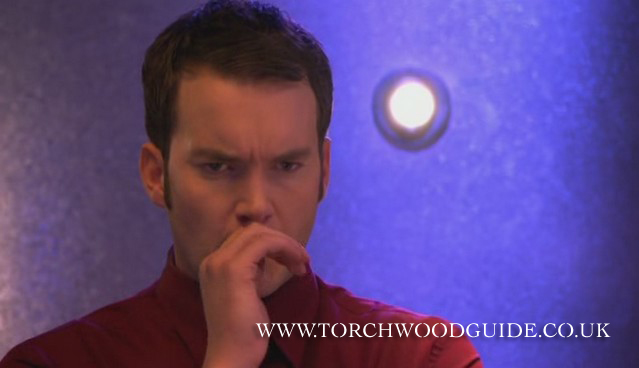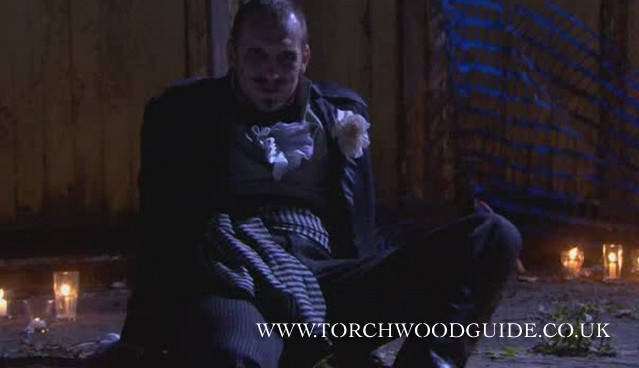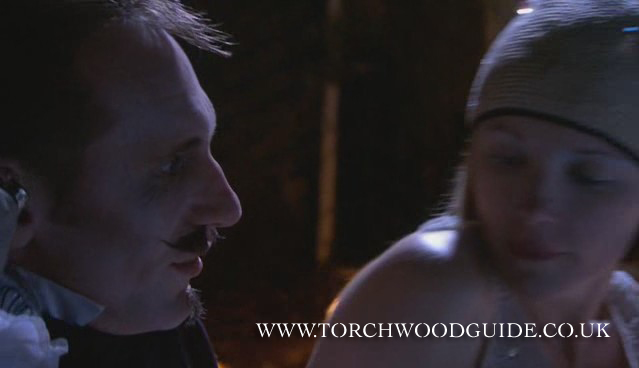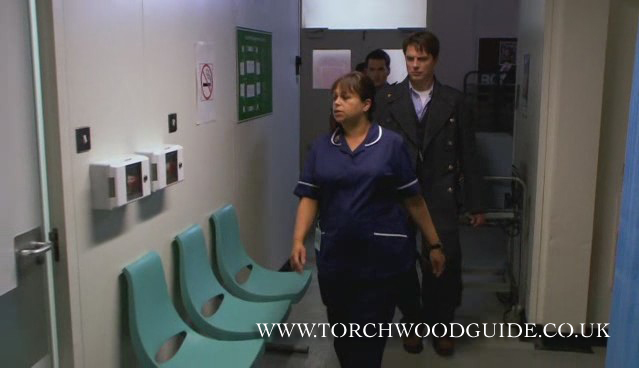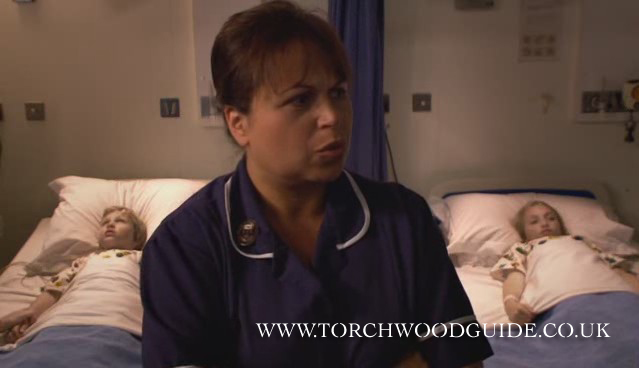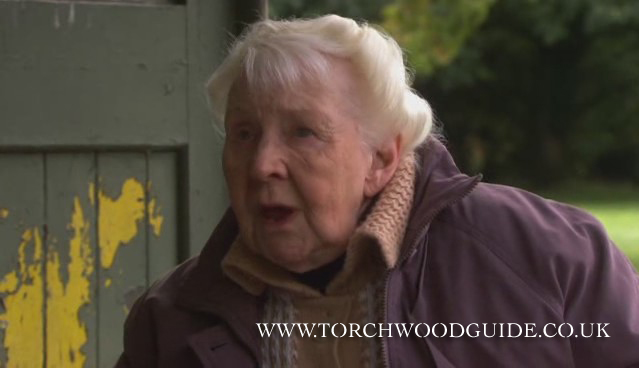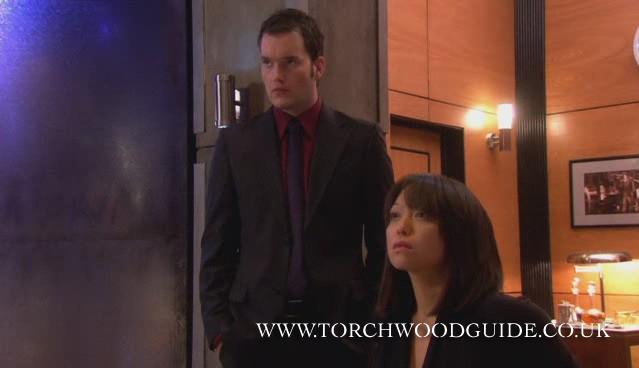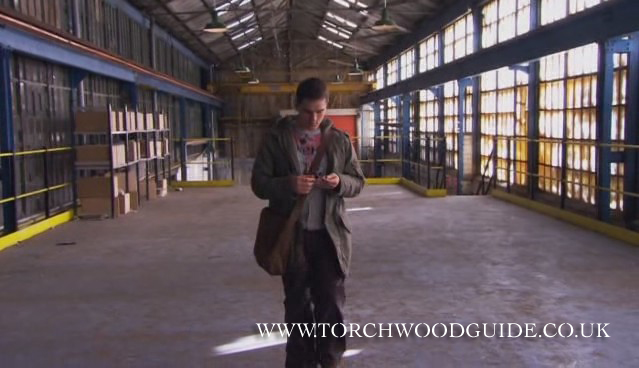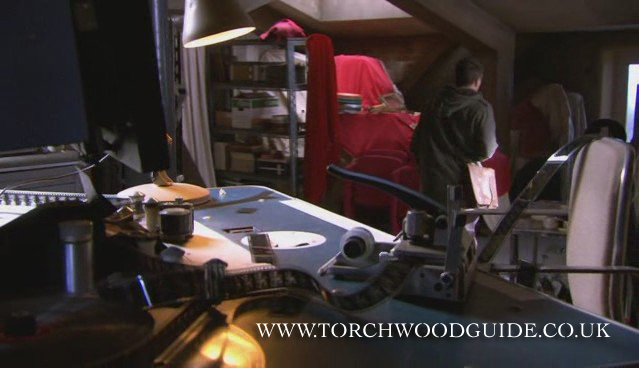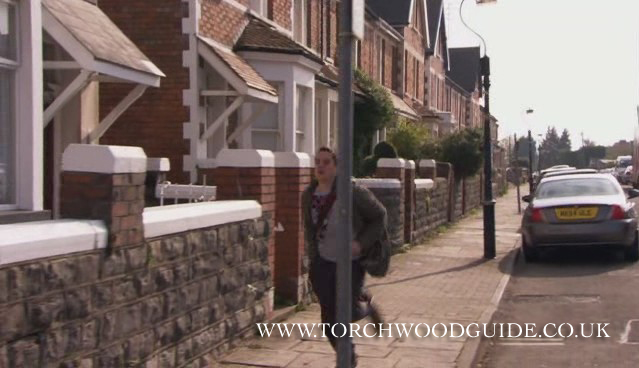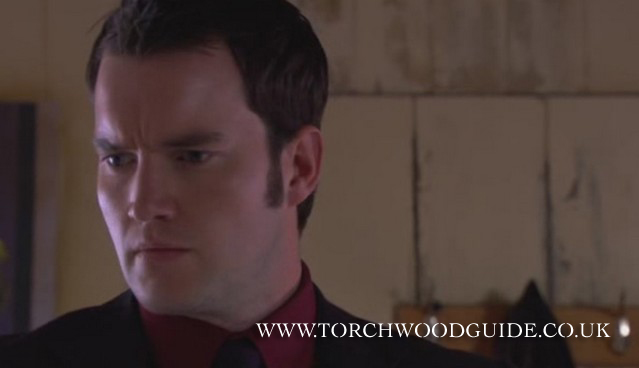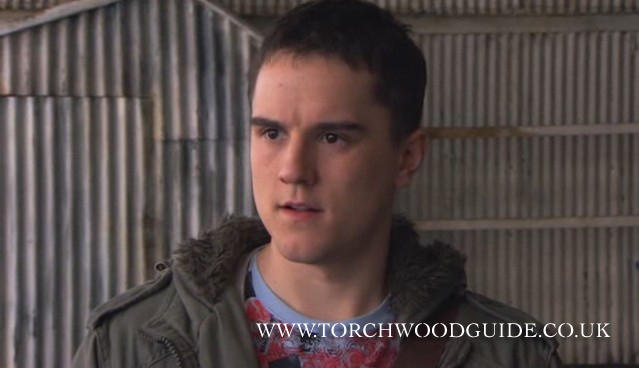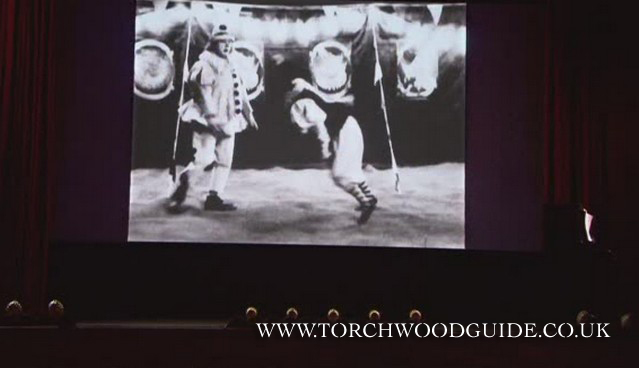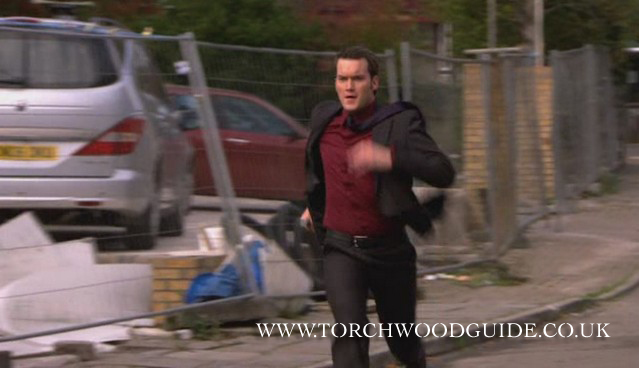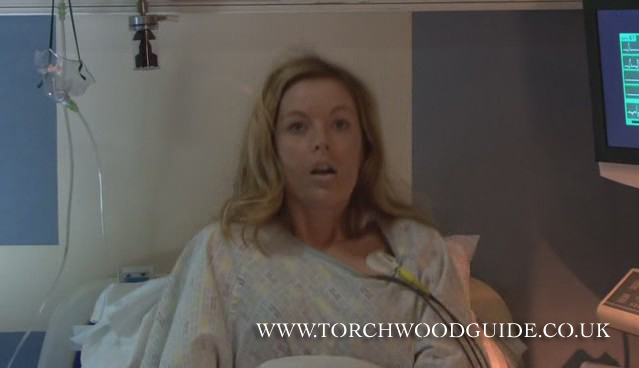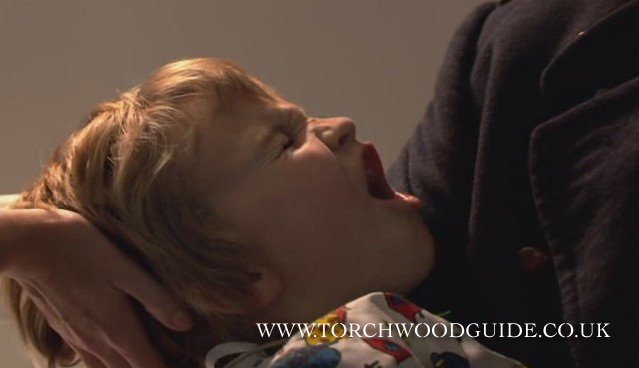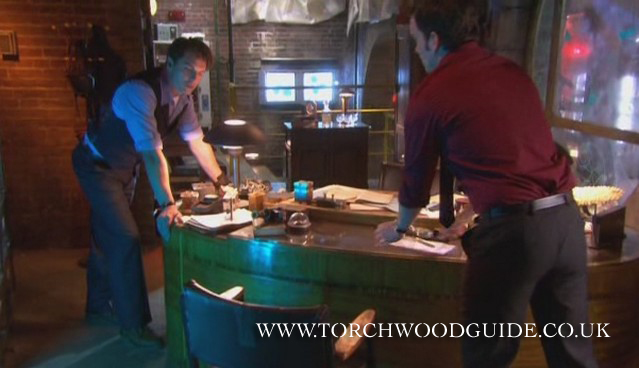Who are the mysterious Night Travellers?
Did Jack Harkness really join a sideshow?
Why are Cardiff residents being drained of their mosture?
These and other questions are answered tonight, in this spectacular extravaganza!
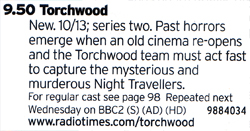
Length 45’27”
First Transmitted
In unedited form at 9:50pm on Wednesday 12th March 2008, BBC Three.
In edited form at 7pm on Thursday 20th March 2008, BBC Two.
The BBC Three broadcast was immediately after the BBC Two broadcast of Something Borrowed
Guest Cast
Julian Bleach (The Ghostmaker); Camilla Power (Pearl); Craig Gallivan (Jonathan Penn); Steven Marzella (David Penn); Hazel Wyn Williams (Faith Penn); Lowri Sian Jones (Nettie William); Eileen Essell (Christina); Anwen Carlisle (Restaurant Owner); Yasmin Wilde (Senior Nurse); Caroline Sheen (A&E Nurse); Alastair Sill (Young Dad); Catherine Olding (Young Mum)
Writer Peter J. Hammond
Director Jonathan Fox Bassett
Setting
At some point after the Honeymoon that Gwen leaves for at the close of Something Borrowed, over one night.
Did You Spot?
The cinema interior is same one seen in Daleks in Manhatten¸ and was also seen in Small Worlds (PJ Hammond’s previous contribution to Torchwood). Owen still has bandaged fingers from A Day in the Death.
Twisted Reality
The Electro does not really exist (or the Palisades Cinema and the Frederick Plaza, also referenced), nor does Hope Street or Chain Lane, although the film footage is mostly genuinely Cardiff. The Westar logo can be seen prominently across the projection equipment – Westar’s mid-priced units are available for purchase. Hope Street seems to look a lot like Swansea (where the real Windsor Café is based). The ambulance seen parked outside the hospital is part of the nonexistent Ambulance Service NHS Trust (in fact it seems that, for some reason, the word “Welsh” has been covered up). Providence Park Psychiatric Hospital is referenced – it too does not exist. The Electro is covered in fake movie posters.
Love is in the Air
Gwen wonders if “local knowledge” is what Jack calls “it” these days.
If it’s Alien, it’s Ours
The Ghostmaker and Pearl are somehow able to steal breaths using a special flask.
Cymru am Byth
The Welsh are shunned in this episode as the very word “Welsh” is covered up (see Twisted Reality).
To Live and Die in Cardiff
The girl in the pre-credits vanishes, never to be seen again. Seven people are dehydrated by the Ghostmaker and later die. The eighth person he dehydrated was revived by Jack’s bringing the flask to his bedside.
Quotables
Christina: Your eyes are older than your face.
Jack: Is that a bad thing?
Christina: Yes. It means you don’t belong. It means you’re from…nowhere.
Weren’t You In?
Julian Bleach is best known for his stage work, but can also be seen onscreen in Beg! (1994), Topsy-Turvy (1999), The Brothers Grimm (2005), The Fall (2006), an episode of The Afternoon Play (2007) and Frankenstein (2007).
Unanswered Questions
Why doesn’t the woman react when her daughter, and the entire show, disappears before her eyes? How is it that the Ghostmaker is able to haunt other films, and further, how can he physically stop the Jonathan from cutting the film, and later prevent him from stopping the projector? How is the rift even involved in the characters emerging from the film? Why do they bring the girl at the bus stop to the hospital and not the hub? Why does the lady at The Windsor Café open the door? And why does she still have all the candles burning at that time of night rather than just switch a light on? Pearl says “I want to drink her tears” – all the The Ghostmaker does is store the breaths in a bottle. When does she figure she’s going to drink anyone’s tears? The hospital staff obviously realise that the victims of these attacks were extremely dehydrated and also not breathing – why didn’t they try to hydrate them, or even put oxygen on them? Where were the families of these particular victims? We know that the first girl was in touch with her parents just before the attack – why were they not summoned to her bedside? Who sent Jack to find the Night Travellers? Did those people know that he couldn’t die before they sent him over? Jack theorises that the Ghostmaker and Pearl didn’t want to be forgotton – how did they develop this type of consciousness on film? What happened to the real people from the show? When did they stop performing? How does Christina realise there’s something special about Jack? How does Jack know that opening the bottle would cause all the people to be lost? To that end, if they opened the bottle to release the breath to its rightful owner, what’s to stop the others from escaping anyway? How would just an open can of film cause Jack to hear the music?
Fuck Ups
BBC Three seemed to accidentally forget to include their logo as a DOG over this episode (it was there the week before and after) on its first transmission – fans were briefly jubilant. Jonathan is reviewing films from the turn of the century, and yet projecting them onto a screen in widescreen mode (CinemaScope, the first widescreen standard, was not introduced until 1953) – if this weren’t odd enough, the clips of the Night Travellers suddenly seem to be normally proportioned, despite being in this ratio. Gwen, Ianto, and Owen dry off awfully fast upon entering the cinema. Jack says travelling shows no longer exist – this is not the case, although the form has moved on a little. The projection unit in the Hub is unfeasibly quiet. The film was 35mm at The Electro, and is suddenly 16mm at the Hub. Ianto asks Tosh to run the film “frame-by-frame” – Tosh sounds a little confused… No wonder, since that’s how film is projected. What Ianto actually wants her to do is slow it down. Pearl goes to great lengths to get water considering she’s in a coastal city. When Pearl gets out of the bathtub, the water level is still shown as filled to the top – displacement apparently was not accounted for. When Jonathan phones Jack, he gets a connection remarkably quickly. This episode again features inconsistencies in Owen’s ability to breathe. The ghost-catcher is quite clearly a shampoo bottle spray-painted silver. Jack makes a big deal about never having met the Night Travellers, and yet he knows the two body-builders in the film. The dehydrated cracks around the little boy’s mouth are not present when Jack gives him his last breath back. The film collector at the end doesn’t even open the canister before he offers to buy. Gerard Carey received a closing credit as Greg, a character from the earlier episode, Meat. Neither the actor nor his character appeared in this episode.
Torchwood: Declassified Episode 2.10 (12’59”)
Broadcast BBC Two, Thursday 20th February, 7:50pm, immediately after the edited version of the main episode.
Russell T Davies, Bev Gerard and Richard Stokes explains how they made a small part of Bute Park look like a massive circus. Camilla Power recalls the filming.
Chris Chibnall and Peter J Hammond talk about the plot.
Stokes and Ray Holman discuss the costumes.
Power, Stokes and Marie Doris on Pearl and her look.
Jonathan Fox Bassett talks about the bus stop scene. Power remembers being cold and Stokes explains why they don’t use warm water.
Bassett and Ben Foster on the importance of music.
Site Review by Arthur Penn
High expectations for this episode (I admit, I’m an unabashed Sapphire & Steel fan, and was justly impressed with Small Worlds) were sadly dashed. I love the concept, I truly do – the Night Travellers are an excellent ‘monster’: so close to human, and so grounded in reality they could be lurking just around the corner… or at your local cinema perhaps. If only more thought had gone into the background of the plot, this episode could have been a winner. At the very least, it would have been nice to understand just exactly what the Ghostmaker and Pearl were trying to achieve.
Hammond is clearly not as comfortable as his peers discussing Owen’s recent situation, or crafting the now-standard Ianto one-liners, as both characters are quietly sidelined (with the exception of a few Cyberwoman-inspired ‘emotional’ moments for Ianto). Tosh, Jack and Gwen also get little to do, but we’ve come to get used to that this year.
Which really just leaves us with the guest characters: A family who own a cinema. Bland and forgettable. I’m all for centring your story around the villains, PJ, but even they weren’t especially well realised (Bleach and Power’s admittedly gripping performances of this flimsy script notwithstanding).I never thought I’d hear myself say this, but… bring on the Chibnall episodes…
Reader Reviews
I’m left a bit speechless by this one. A more disjointed and disappointing episode of Torchwood has never been written. The story tried to move in too many directions, the dialogue was austere and forgettable, there was barely time to understand or care about any of the characters. Even within our own team, there was no spark or interest – and for the third week in a row, Owen’s being undead was acknowledged by the villain. I understand that Owen would like to die for real – does it need to be shoved in our faces every week? Pardon me while I yawn.
Even by the end of the episode, the Ghostmaker’s motive is never really established. Seemingly his quest is to stay alive, then it’s about being remembered, then it’s about stealing a person’s last breath, then it’s about having an audience, then it’s about watching the ghosts, and then about taking over the city. Pearl wants to taste people’s tears, but if the breaths escape from the bottle both the ghosts they were collecting AND the breaths disappear. She seemed to crave/need water – in a city that is mostly bordered by water, you’d think she would come by it easily enough. It even crossed my mind that she’d require fresh water…until she mentions wanting to drink tears. The whole idea of dehydration seemed to just be a mechanism to give a special nod to the makeup team – the point of sucking the moisture out of people never really materialised. Jack’s presence in the video footage was improperly explained, at different times leading the viewer to believe he both travelled with and never met the night travellers. The audience is left shaking their heads in confusion, desperately trying to make sense out of all these riddles.
I enjoy the “unreality” one can expect from Sci-Fi. It’s exciting, fantastical, and a departure from the ordinary. It also requires good storytelling. I don’t think it could have been underlined more emphatically that this episode was the perfect illustration of how NOT to write science fiction. Bad form guys, bad form.
Ceres D’Aleo

